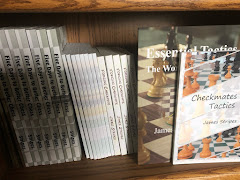I am determined to establish a new pattern, reading all of Informant 128.
Since Thursday, I have read all of the narrative text in Ernesto Inarkiev, "Moscow Candidates Tournament 2016"; Aleksandar Colovic, "Moscow Opening Report"; and Sarunas Sulskis, "European Championship 2016". I also solved rather quickly the first ending and was working on the second when I was interrupted by a text message that required action. Using the CD version that comes with the printed book, I have been working through the games and analysis in Inarkiev's article.
Black to move
Sergey Karjakin played 17...cxb4.
Inarkiev's comment brought my reading to a halt. He writes, "This is a tempting decision. Black sacrifices his queen for a rook, minor piece and a pawn, a balance of material that is usually sufficient" (18). My eye did not perceive the danger to the queen until I saw 18.axb4 Bxc3 19.Nc6 on the board, and only then could I begin to calculate the resulting imbalance.
Karjakin's determination at the Candidates shines in Inarkiev's narrative and analysis. The depth of the analysis and the complexity of the games reveals to me that my determination to read all of the issue clear through will require a significant investment of time.
My reading of Informant goes back two decades. The quality of my play has benefited. On this blog, I wrote about the first tangible benefit--a correspondence win in the 1990s--in "Playing by the Book" (March 2011). In a more recent correspondence game, I had this position with White.
White to move
Our game had been following Botsari -- Polgar,J, Eretria 2011, which Polgar won. Botsari played 28.Re7 and Polgar's pieces put an end to White's initiative. Apparently unbeknownst to my opponent, however, was the analysis of this game in Informant 112/51 by Dejan Antic who recommended 28.f7. I played that move and our game followed Antic's line 28...Rg7 29.Re8+ Nf8 30.Qd6 and then instead of the necessary 30...Qh4, my opponent played 30...Qh5+ and I won a few moves later.
Improving
If I continue to read Informant in bits and pieces and utilize my complete collection in electronic format as a reference in correspondence games, I will continue to see benefits. But I want more. I remain determined to improve my performance in USCF tournaments, reverse the slow downward slide that has been occurring since summer 2012, and renew efforts to push to a new peak rating (see "Eleven Consecutive Wins!" [July 2012]). I believe that Informant is among the most useful tools that I have for improving.
In the wake of my tournament success in 2012, I purchased Informant 113 as book and CD combination. Prior to that point, I acquired most of my Informant books after they went on sale because they were a year or more out of date, and acquired even more electronically via the CDs that had a year's worth. Gaps in my collection were filled when I placed fifth in the Reader's Contest for those who purchased Best of the Best 1000 (2008). When I bought Informant 113, I had a complete collection through the current issue. Several months later, when my collection was no longer current, I began systematically working through the games section (see "Training Log: August 2013"). That enterprise lasted several months, but eventually gave way other training priorities and my recurring obsession with blitz.
I bought a few more multi-issue CDs in 2014. Then, with download editions of Informants 119, 120, and 121, I was up-to-date with the latest issues. These were followed with timely downloads of Informants 122 and 123, keeping me current. Beginning with Informant 124, I became a subscriber. Each issue becomes the center of my chess focus for a few weeks after its arrival, but I never get through more than a fraction of the issue. I skim several articles and play through the games that interest me. Several printed issues contain brief notes that I make as I go through the games on the screen of my computer.
I am determined that with Informant 128 I will maintain the focus and self-discipline to work through every article, the games section, and the endings and combinations sections. There will be distractions. Since Thursday, I have played dozens of blitz games online. I also remain committed to study of Greco's and Morphy's games. I use these with my students. Time spent reading Informant must balance with study of classics.
The time and effort spent on Informant will improve the quality of my play.


















Hi, James.
ReplyDeleteDo you track how much time you spend in the bits and pieces of Informants? I'm interested to know, if you track your data, the percentage of an Informant you've covered and the time spent. I have all of the Informants, but I'm only just beginning to use the material. I want to gauge how much time I'm looking at to study an Informant at various degrees of intensity.
No, I don't track my time. In the early 1980s, I tracked everything I did via Daytimer planners. My creativity suffered.
Delete